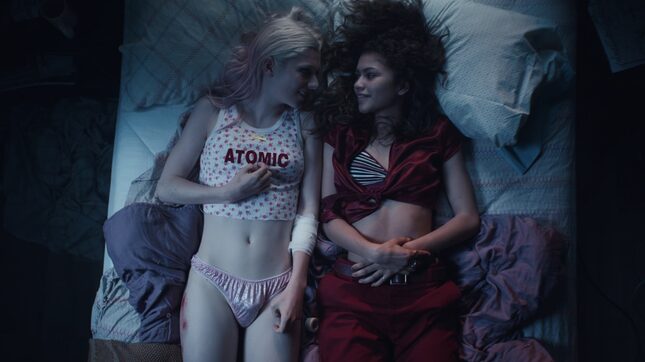

Unlike other Gen Z-focused shows, the high schoolers on Euphoria don’t talk about Instagram so much as they just use it—less a signifier for older audiences and more like it really is: The inevitable wallpaper of modern life. Kat (played by Barbie Ferreira) absentmindedly scrolling through Insta after losing her virginity; McKay (Algee Smith) watching who he thinks is Cassie (Sydney Sweeney), the girl he likes, having sex with his friend on an iPhone video; Jules (Hunter Schafer) arranging a meet-up with an older man on a Grindr-style app. The deadly combo of technology and hormonally inflamed teens, of course, can lead to some of the worst kinds of trouble—in particular, the spreading of nudes without the consent of the person in them, which has notoriously contributed to an increase in cyberbullying and sexting-related suicide. Zendaya, excellently portraying lead character Rue Bennett, a suburban teen who self-medicates her mental health issues to the point of addiction, gives a voiceover about nudes that’s prematurely jaded and generationally cutting:
“Here’s the thing that fucking pisses me off about the world. Like every time someone’s shit gets leaked, whether it’s J. Law or Leslie Jones, everyone’s like, Well if you don’t want it out there, don’t take the nudes in the first place. I’m sorry, I know your generation relied on flowers and father’s permission, but it’s 2019, and unless you’re Amish, nudes are the currency of love. So stop shaming us. Shame the assholes who create password-protected online directories of naked underage girls.”
This monologue is delivered while a group of horny, weeded bros look through Cassie’s nudes, and leads up to a moment at a party when Cassie and McKay start having sex; he jumps on her and puts his hand around her throat, mimicking both the video he saw and, as Rue points out, the unrealistic standards of mainstream porn through which teens are learning about sex, now that no one teaches sex ed in schools anymore. The scene cuts out, though, and Rue’s voiceover breaks the tension that permeates the sex threading the entire episode: “Now, I know this looks disturbing, but for real, I promise you, this does not end in a rape.”
-

-

-

-

-

-

-

-

-

-

-

-

-

-

-

-

-

-

-

-

-

-

-

-

-

-

-

-

-

-

-

-

-

-

-

-

-

-

-

-








































